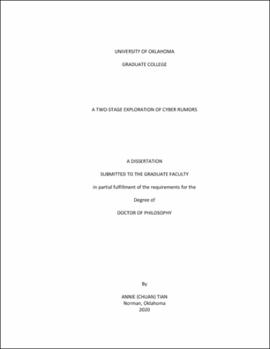| dc.contributor.advisor | Jensen, Matthew | |
| dc.contributor.author | Tian, Chuan | |
| dc.date.accessioned | 2020-07-29T18:24:17Z | |
| dc.date.available | 2020-07-29T18:24:17Z | |
| dc.date.issued | 2020-07-30 | |
| dc.identifier.uri | https://hdl.handle.net/11244/325317 | |
| dc.description.abstract | The rise of online social networks (OSNs) has dramatically accelerated the diffusion of large-scale information cascades, leading cyber rumors to coalesce into a global social phenomenon. In this dissertation study, I conducted two rumor-related inquiries. Grounded in the research on discourse hedging, meta-cognitive theory (MCT), and warranting theory (WT), the first inquiry sought to develop an effective mechanism for helping users better understand the reliability of rumors so that they can make a more informed evaluation of the rumors. I investigated several candidate rating mechanisms and examined their relative efficacy in influencing users’ evaluation of rumors on social network platforms. The second inquiry focused on people’s rumor transmission motivation. Past rumor research has emphasized the role of plausibility in rumor transmission, finding it to be a core determinant of rumor spread. Yet individuals frequently share implausible rumors, which leads to a plausibility paradox of rumor sharing. Drawing on dual motivation theory, I argue that rumor novelty and plausibility influence sharing intention through utilitarian and hedonic motivation. This dissertation reports the results of a controlled, randomized experiment (N = 356) investigating the two research inquiries. Although I found no statistically significant results in support of the hypotheses for the first inquiry, the dissertation yielded valuable insights for developing future studies and designing viable and effective technical solutions by shedding light and provides nuances on the designing of technical mechanisms by illuminating the varying nature of the rating system contingent to specific circumstances and topics.
Results for the second inquiry demonstrated both utilitarian and hedonic motivation increase rumor sharing intention. Although rumor plausibility significantly increased utilitarian motivation, it had no effect on users’ hedonic motivation. However, rumor novelty led to higher rumor sharing intentions by increasing both the hedonic and utilitarian motivations. Our findings on the effect of novelty extend and deepen our understanding of rumor sharing by revealing that infusion of novelty into rumors can give rise to higher utilitarian value, rendering the information processing not only more enjoyable but also potentially more illuminating. | en_US |
| dc.language | en_US | en_US |
| dc.subject | Online Information Processing | en_US |
| dc.subject | Cyber rumors | en_US |
| dc.subject | Deception | en_US |
| dc.title | A Two-Stage Exploration of Cyber Rumors | en_US |
| dc.contributor.committeeMember | Miranda, Shaila | |
| dc.contributor.committeeMember | Santhanam, Radhika | |
| dc.contributor.committeeMember | Durcikova, Alexandra | |
| dc.contributor.committeeMember | Bolino, Mark | |
| dc.date.manuscript | 2020-07-05 | |
| dc.thesis.degree | Ph.D. | en_US |
| ou.group | Michael F. Price College of Business | en_US |
| shareok.nativefileaccess | restricted | en_US |
